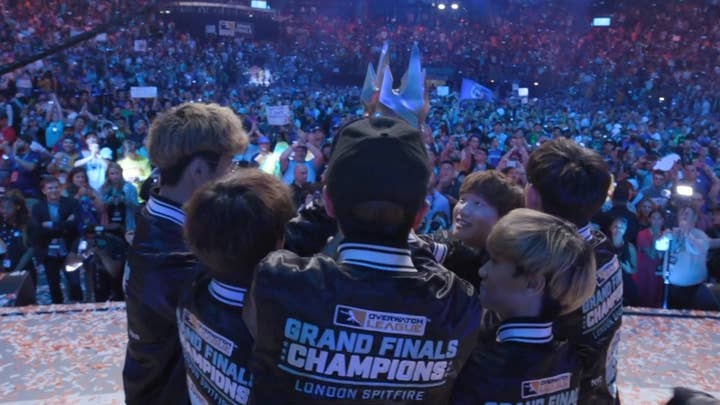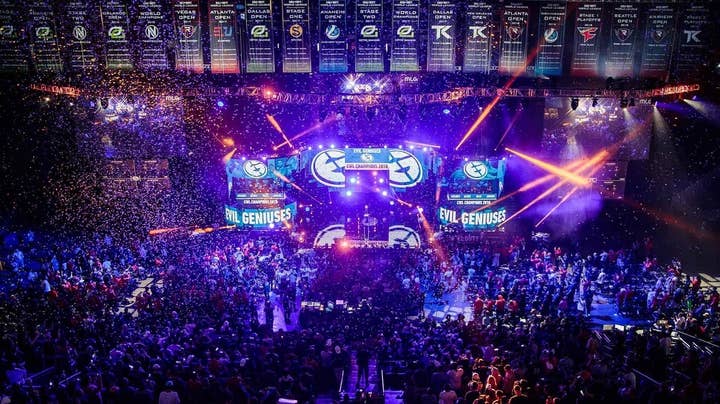Adapting to the evolution of esports
Major League Gaming co-founder Mike Sepso explains why the original MLG wouldn't work today, and how his new start-up Vindex is positioned for the future
Mike Sepso has been involved with esports for about as long as it's been called esports.
Speaking with GamesIndustry.biz recently, Sepso explains why he and Sundance DiGiovanni co-founded Major League Gaming back in 2002 and what need in the market that outfit was intended to fill.
"We saw that people liked to compete in video games against each other, and there was some semblance of professionalized esports or competitive gaming happening in South Korea," he says. "What we thought was that was an interesting place to combine our passions for sports and video games, and help elevate competitive gaming into a professional sport. At the time, the game publishers and studios were really not interested in that at all, and certainly not interested in turning it into a business. If anything, it was just sort of a marketing or community engagement effort."
That apathy from the publishers worked to MLG's advantage, as it could license the rights to run official leagues for popular games because the publishers weren't terribly interested in doing it themselves. Unfortunately, whatever success MLG enjoyed was in some ways self-defeating.
"Inevitably what happened was that as esports became a much bigger and bigger thing, the publishers decided that would be something they wanted to own," Sepso says.

Sepso saw Activision Blizzard as one of the biggest and most forward-thinking publishers moving towards esports in a big way, and left MLG to help build the publisher's esports division in 2015. Months later, Activision Blizzard acquired MLG outright.
"A few years ago, that concept of an independent league that could utilize different games sort of went away," Sepso says. "Certainly when we introduced the Overwatch League from within Activision Blizzard, I think most people in the industry realized at that point the idea that there would be an independent league that didn't actually own the game it was operating the league around was going to be a next to impossible thing to do at any level of scale with any success...
"The league, the studio development team, and the publisher all have to operate in lockstep in order for esports to be successful, and that's tough to do when it's an outside third-party that is not directly tied in to controlling how the game's being built"
"I think what you see now are no actual leagues. What you see now are tournament organizers. So it's kind of like tennis or golf, where you can create a single big tournament or event and maybe that recurs every year, but your access to game IP is going to be [limited]. You're sort of excluded to only those games that don't have leagues around them."
Additionally, the move towards games-as-a-service has only made it harder for anyone to run a competitive league except for the people making the game.
"Games go on forever now, especially games that are big in esports," Sepso says. "So the league, the studio development team, and the publisher all have to operate in lockstep in order for esports to be successful, and that's tough to do when it's an outside third-party that is not directly tied in to controlling how the game's being built."
So when Sepso and DiGiovanni teamed up again last October to start a new esports company, they took a different tack. The pair co-founded Vindex, an esports infrastructure company established to help those big publishers establish and execute their own esports leagues and/or ambitions with some experienced help.
"If you think about how we set up Vindex and the time we set it up, it's because the big publishers want to control and set the vision for what the league or esports program is, but they don't necessarily have all the capabilities in-house to execute on it," Sepso says. "And most of the time they want some outside help to think through what the strategy is. They want organizations that have a deep understanding of the player base, the fanbase, how things have happened and evolved over time."
As for whether success this time around will similarly make publishers eager to cut third parties out of the deal and handle everything on their own, Sepso doesn't think comparisons to MLG hold water.
"It's a misunderstanding to think that publishers are bringing literally everything in house," Sepso says. "The NFL doesn't do everything to make Monday Night Football happen, but they control the game. I think that's the model we're moving toward. With Activision Blizzard, none of this existed. There was no Vindex. We had to sort of do it all in house, but I think over time... they will depend on third parties more and more to help actually execute more and more of that."
"Almost all of the investment that's come into esports in the past couple of years has gone into team ownership, and almost all of it has been from investors who've never been in the video game space at all before"
With no real consumer-facing presence as yet, Vindex's prospects rely on its clients -- companies in or entering the esports space -- making a healthy business out of it. With that in mind, we ask about the assortment of high-profile setbacks and flameouts in the esports scene as well as the continued money pouring into it to ask if he sees the overall esports ecosystem as healthy.
"I definitely think it is," Sepso says. "Almost all of the investment that's come into esports in the past couple of years has gone into team ownership, and almost all of it has been from investors who've never been in the video game space at all before. From that perspective, it's great that there's all this outside capital coming into the ecosystem. I think teams, especially teams that own home market franchises or some level of exclusivity in the market with a fixed-ownership permanence, were the first institutionally investable things in the esports space, outside a couple of companies like MLG."
Sepso believes there's been an imbalance between the demand from wealthy parties looking to invest in the esports space and the supply of "institutionally investable" properties like those teams available.
"I think this idea that there's a valuation bubble in esports teams is truly driven by the demand of capital wanting to own a piece of this space. I don't think it's very telling about how healthy or not the business is. And having been there on the inside of the formation of the Overwatch League and then the Call of Duty League, seeing that all develop and talking to the guys at Riot, being part of team ownership groups that own different teams in these league, it is certainly still in the early, speculative stage, but they are very healthy businesses, and I think many of them are going to build incredibly valuable assets."
So at what point does he see esports leaving that early, speculative stage? He points out that Vindex has raised more than $60 million, has 120 employees and is profitable, so in some ways it already may have. However, he also notes that owning an esports team is more about building asset value in the franchise over the long-term, so it may be tough to call that part of the business mature.
"We're dealing with a purely live, digital media format and distribution model that's relatively new. Even Google and Amazon haven't completely figured it out yet"
"There are different elements of this industry that are very comparable to other industries and other companies, and you can't judge the whole thing as one," Sepso says. "Teams are very different than infrastructure companies, very different than media distribution platforms. But I think if you look at the companies involved and the investors involved in this space, you're talking about the biggest and best video game publishers in the world owning the underlying IP, the largest technology companies in the world owning the media distribution platforms -- YouTube, Twitch, Mixer, and others -- and some of the most successful asset manager and traditional sports team owners as investors. So it's hard for me, and it has been for many years, to bet against that kind of dynamic."
Clearly, Sepso is a believer in esports, having established his career in it for the past 17 years and only pushing himself further into it as he looks to the future. But he still acknowledges there are challenges facing the field.
"The biggest issue for the industry as a whole is keeping up with this demand from the audience for more and more, and bigger and bigger," Sepso says. "Execution is an issue. Talent base is an issue, having enough people that know what they're doing in the space and working on it. It's just a time of massive growth. Expectations are very high and there's a lot of money on the line, so I think that's part of the role we're trying to fill at Vindex is supplying very experienced help and advice and top technological solutions to help execute against that.
"Longer term, the whole industry has to continue to do a good job of communicating to the advertising industry how valuable and engaged our audience is, and helping find new ways to monetize all the things we're doing with advertising in ways that maintain authenticity and don't disrupt the fan experience. We're dealing with a purely live, digital media format and distribution model that's relatively new. Even Google and Amazon haven't completely figured it out yet. So we're in the center of a Venn diagram of clearly interesting and dynamic macro trends across media and technology that makes esports in many ways sort of a proving ground for a lot of these things.
"What's undeniable is there's a huge global, growing audience that absolutely loves this kind of content, loves the games, loves to watch the professionals play them. I think if we as an industry continue to innovate and take care of the fan, and make sure they have a better and better experience over time, the rest of it will work."

